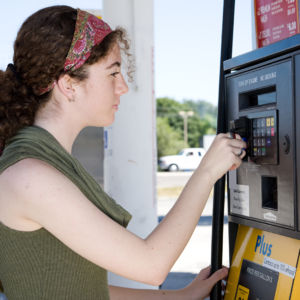There’s talk of raising the federal gas tax by as much as 25 cents per gallon, and a lot of different groups are seeing something appealing in the proposed hike: politicians see a revenue raiser to pay for new infrastructure spending, environmentalists see an excise tax to discourage the burning of fossil fuels, and some free-market economists see a “user fee” that puts the cost of maintaining roads onto those who actually use them. Sounds like a win-win-win, right?
Not so.
The first problem with the federal gas tax is that it’s federal. Public infrastructure, meanwhile, is primarily owned by state and local governments. As economist Veronique de Rugy of the Mercatus Center explains, the current system “collects money in the state and sends it to the federal government, where bureaucrats take their cut before sending the money back to the states via politically designed formulas.”
The federal gas tax, in other words, is not the natural match for infrastructure that many assume.
Environmental benefits likewise wither under scrutiny. Theoretically, an excise tax on fossil fuels would discourage their use, following the basic principle that when you tax something, you get less of it.
Unfortunately, when politicians get their hands on the funds that are raised by a tax, they become addicted to it. This creates an incentive to prevent drivers from finding alternatives to fossil fuels — exactly the sort of behavior that environmentalists hope to achieve — to preserve their revenue streams. While this problem could be avoided by rebating the tax back to consumers, that’s not being discussed in this case because it is intended to pay for new spending.
Free marketers who see in the gas tax a “user fee” are being similarly naive. It would be ideal for roads to be funded by those who use them and thus contribute to their deterioration, but that’s not going to happen under the current system. The Highway Trust Fund is frequently used to pay for wasteful or extravagant projects with nothing to do with highways, leading to shortfalls that are often then taken out of general funds.
The tax is also not levied in a manner that is proportionate to a user’s contribution to wear and tear, as heavy trucks do an outsized share of the damage even after accounting for gas mileage. And if politicians do manage to resist incentives to prevent users from adopting substitutes to fossil fuels — such as with greater use of electric or highly-fuel efficient vehicles — then the tax will little resemble a true user fee since it won’t apply to a growing share of drivers.
Ultimately, much of the problem is that Washington politicians don’t find basic road maintenance “sexy” enough to brag about in their campaigns. Repairing roads might fly for a local official, but for good or ill, voters expect their Washington representatives to really bring home the bacon. So, they’d rather fund new projects, like the “Bridge to Nowhere,” that often don’t match the needs of local communities.
Funneling more dollars through Washington with higher federal gas taxes would just perpetuate the problem of federal government as wasteful middleman. A federal gas tax, in other words, serves none of its supposed purposes well.
The one thing it does extremely well is harm American drivers. A report from Strategas Research estimates that the tax along with higher fuel costs would take $71 billion from consumers, or 60 percent of their expected gains from last year’s tax cuts. Republicans fought hard to deliver a historic tax package that is already paying dividends for the vast majority of Americans. To ask them to now give a big part of it back is both perverse and politically foolish.
Groups like the Chamber of Commerce and the American Trucking Association think they can profit from a federal infrastructure splurge and are embolden by Trump’s signal that he’s willing to consider higher gas taxes. But doing so would undermine his successful tax reform, squeeze middle-class Americans, and harm the economy. And it just won’t work.

